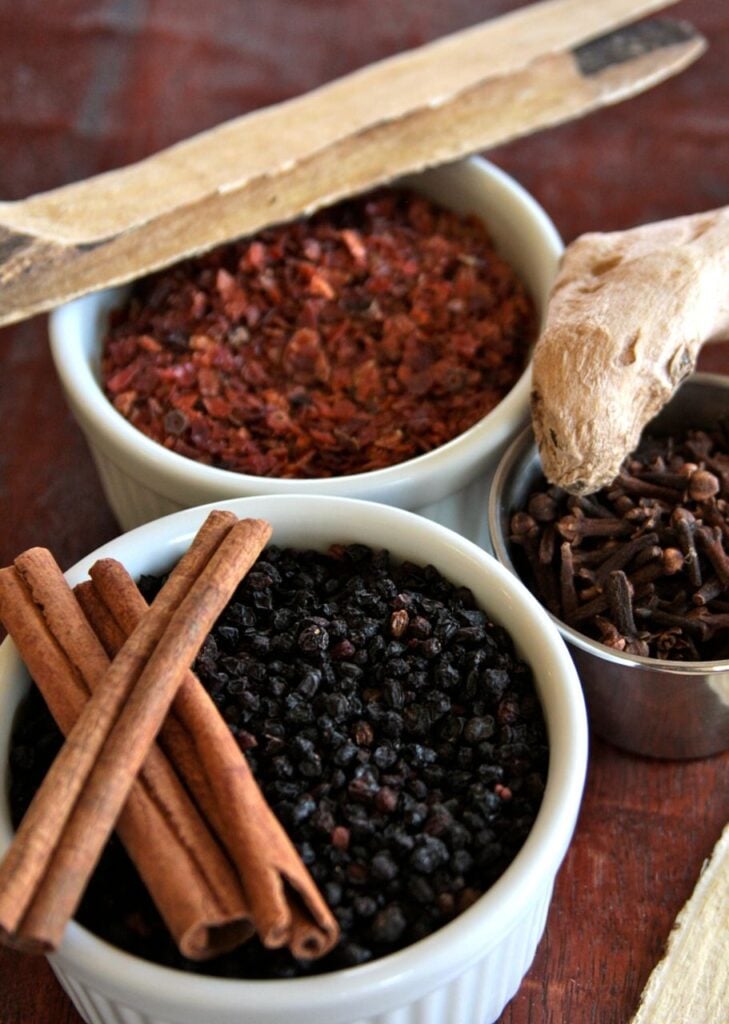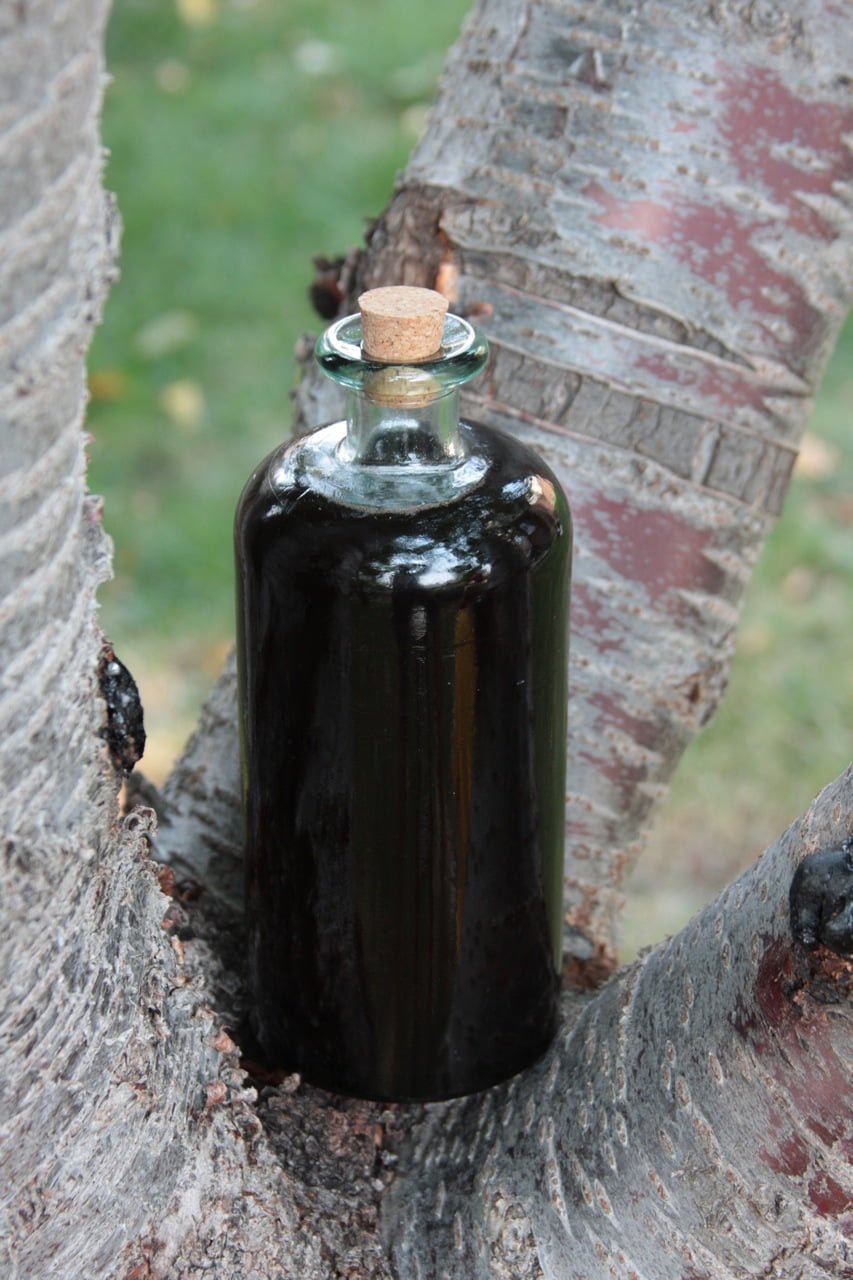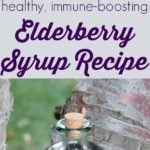Immune Boosting Homemade Elderberry Syrup for Kids
Elderberry syrup is an effective natural remedy for colds and other mild illnesses that go around in winter. It is easy and inexpensive to make at home. Little ones are generally happy with the taste of this homemade elderberry syrup for kids recipe.
For most moms, there’s no time to be sick — or worse — have a sick child. Luckily, there’s a home remedy that can help your family prevent or lessen the effects of what goes around during cold and flu season.
Elderberries for Immune Health
Elderberry has been found effective against a wide range of influenza viruses including human, swine, and avian strains. And this study in Norway found that people who took elderberry syrup after they came down with an illness experienced fewer symptoms and recovered more quickly than people who didn’t.
For centuries, people have made the cold remedy using just elderberries, water, and honey.
Where to Find Elderberries for DIY Syrup
In North America, wild elderberries often grow in the eastern, central and western regions. You can find them along roadsides, in fields, and in wooded areas. Elderberry plants typically thrive in moist and well-drained soils. So, with a proper lesson in foraging, you may be able to source your homemade elderberry syrup for free.
Not all parts of the elderberry plant are safe for consumption. The berries are usually dark purple or black when ripe and are ready to be picked from late summer to early autumn. The leaves, stem and unripe berries of the elderberry plant contain a toxic compound called Sambunigrin and should not be consumed.
Organic dried elderberries are available in bulk online. You can also find a DIY elderberry syrup kit.

Homemade Elderberry Syrup for Kids
This recipe is a slight variation on the ancient elderberry theme to give it more flavor and immunological punch.
Elderberry Syrup Ingredients
- 1 cup dried organic elderberries
- 1/2 cup organic rosehips
- 5 sticks cinnamon
- pinch of cloves
- a few pinches grated ginger root
- 5 sticks astragalus root
- 4 cups filtered water
- 1-2 cups local honey (Honey intended for children 12 months and older)
How to Make Elderberry Syrup
- Bring 4 cups of water to a boil and add the herbs. Do not add honey yet.
- Cover pot and reduce heat to a simmer.
- Simmer for at least half an hour, strain out the herbs (use a stainless mesh strainer, not plastic) and pour the liquid back into the pot.
- Continue to simmer with the lid off until reduced to 2 cups.
- Add 1-2 cups of honey and warm until well integrated.
- Bottle, refrigerate, and use within 2-3 months.
How Much Elderberry Syrup Does a Child Need?
To maintain a strong immune system, adults can take 2 tablespoons daily. Children can take 1-2 teaspoons daily. During an illness, you can double this amount until symptoms disappear.
What About Premade Elderberry Syrup?
Or you can buy pre-made organic elderberry syrup or kid-friendly gummies. They’re effective and available in many health stores and online. Sambucol Black Elderberry Syrup is an excellent option if you don’t have the time or interest in DIY.
The main drawback to pre-made syrup and gummies is cost. They’re quite a bit more expensive compared to making your own.
Can Babies Have Elderberry Syrup?
Because an infant’s immune system is still developing, it’s advised that babies who are less than one year old don’t consume elderberry syrup. Here’s why:
- Honey Risk in Homemade Elderberry Syrup:
Many homemade elderberry syrup recipes include honey as a sweetener. Honey is associated with the potential for infant botulism. Clostridium botulinum spores found in honey can produce a toxin in an infant’s immature digestive system. - Immature Immune and Digestive Systems:
Their immune and digestive systems are still developing, and there is limited research on the safety and appropriate dosage of elderberry for babies. - Potential for Allergic Reactions:
Elderberries, particularly if not properly cooked, can be toxic due to cyanogenic glycosides in raw or unripe berries. While cooking destroys these compounds, there’s still a risk of allergic reaction or sensitivity in very young children. - Lack of Pediatric-Specific Studies:
Most studies on elderberry focus on its effects in adults and older children. Research is lacking on its safety, efficacy, and proper dosage in infants.
More Herbal DIY for Families
Here are more family friendly holistic DIY’s:
Homemade Herbal Vapor Rub
DIY First Aid Ointment
How to Make a Natural First Aid Kit
DIY Iron Syrup



I want to share my experience! For the last couple of years, I have been taking Wellabs Elderberry Syrup as such cold symptoms are the first symptom of a cold. And all family members too. It helps to feel better quickly. And if we do get sick, it is much easier and faster than it was before. I think the vitamin in the composition of the syrup affects this.
I just made my first batch in my instant pot. So easy. I am excited to see if this helps kick our colds. I don’t want to put medicine in our bodies.
Why rosehips and astragalus root?
This syrup is awesome.. Me n my family have been having this n it has done wonders. Now that I’m pregnant n I don’t know if I can have it. Is this safe to have while pregnant?
I am so glad you love the syrup as much as I do! It keeps my three children healthy all winter long (even when they are surrounded by sick children)! And yes, you absolutely can take it in moderation while pregnant . One to two tablespoons daily is totally safe.
Great recipe. I like the addition of astragalus root and rose hips. We make a similar syrup but without these two ingredients and use fresh berries instead of dried ones. Love this site!
Where would I begin to look for dried elderberries, rosehips and astragalus root?